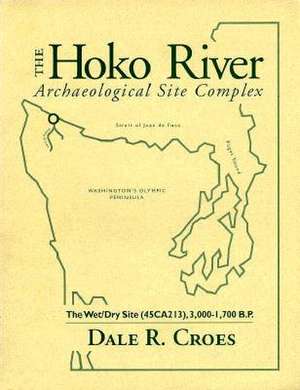The Hoko River Archaeological Site Complex: The Wet/Dry Site (45ca213), 3,000-1,700 B.P.
Autor Dale R. Croesen Limba Engleză Paperback – 31 dec 1995
Preț: 226.01 lei
Nou
Puncte Express: 339
Preț estimativ în valută:
43.25€ • 47.12$ • 36.44£
43.25€ • 47.12$ • 36.44£
Carte indisponibilă temporar
Doresc să fiu notificat când acest titlu va fi disponibil:
Se trimite...
Preluare comenzi: 021 569.72.76
Specificații
ISBN-13: 9780874221176
ISBN-10: 087422117X
Pagini: 248
Dimensiuni: 216 x 279 x 17 mm
Greutate: 0.75 kg
Ediția:New.
Editura: Washington State University Press
ISBN-10: 087422117X
Pagini: 248
Dimensiuni: 216 x 279 x 17 mm
Greutate: 0.75 kg
Ediția:New.
Editura: Washington State University Press
Textul de pe ultima copertă
Three thousand years ago, Native Americans on Washington's Olympic Peninsula occupied a key seasonal fishing camp on a bar of the Hoko River, close to the south shore of the Strait of Juan de Fuca. Over the centuries, these ocean-oriented peoples discarded cordage, basketry, bent-wood fishhooks, woodworking tools, faunal and floral remains, and other cultural materials at a bend in the Hoko River. The perishable items were remarkably preserved in wet, low-oxygen deposits. From 1977 to 1989, archaeologists under the direction of Dr. Dale R. Croes excavated these deposits, as well as nearby habitation sites, recovering nearly 5,000 artifacts. Today this project is recognized as one of the most important "wet" archaeological sites in the Pacific Northwest, where hydraulic excavation techniques were developed and utilized. Croes's analysis of the site is a valuable contribution to the archaeological and anthropological literature of the Olympic Peninsula and the Northwest Coast cultural areas. The study includes comparisons with other Northwest wet sites, particularly the mud-slide buried Ozette longhouses on the outer Olympic Peninsula.
